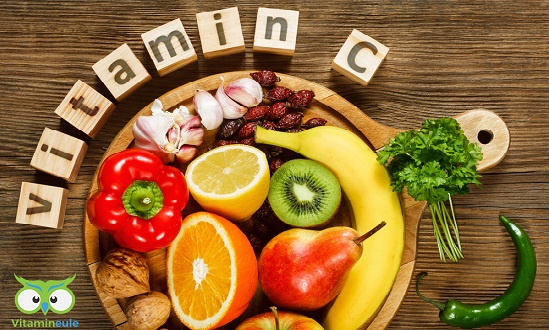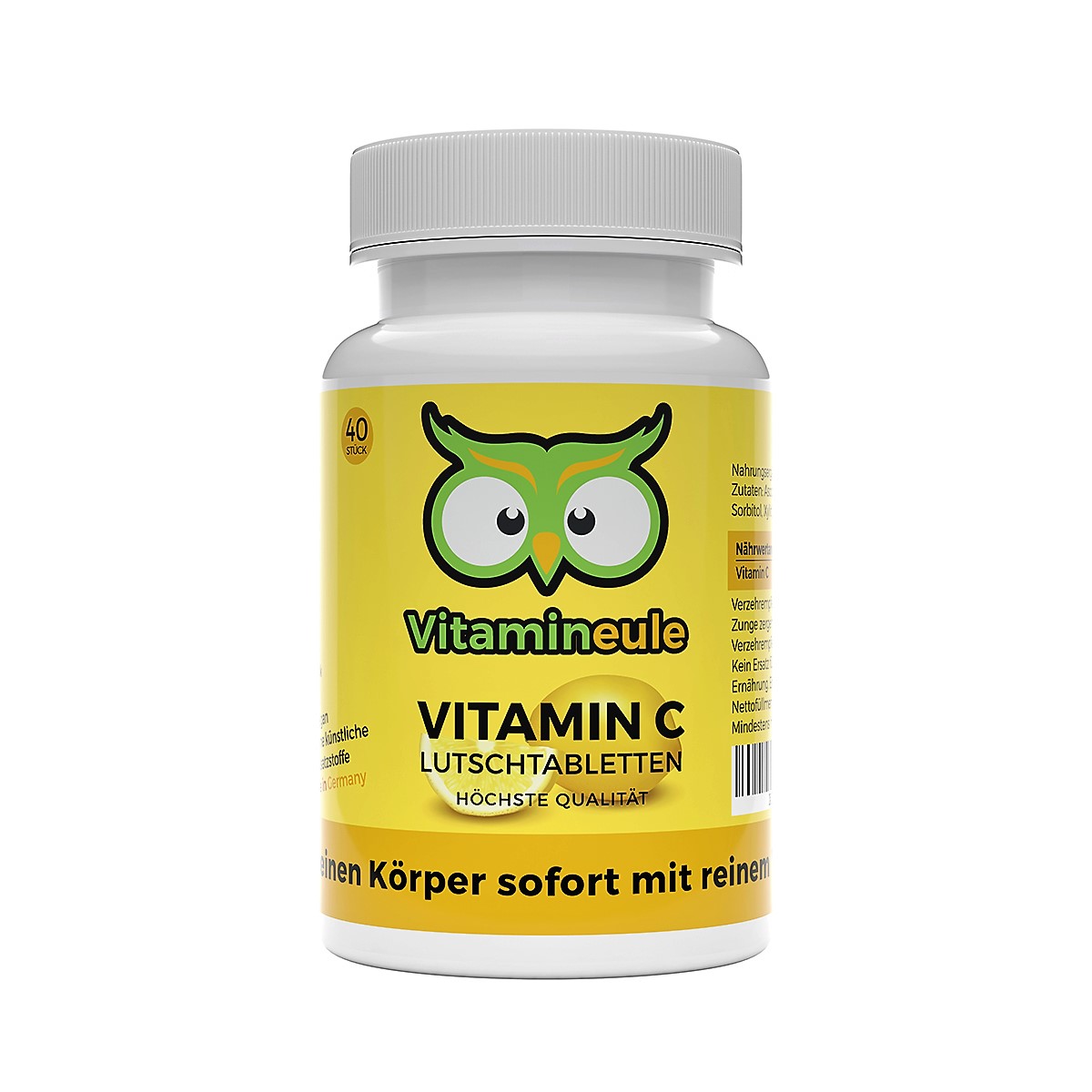

Team Vitamineule
Questions, wishes or suggestions? Simply contact us by e-mail or on Facebook.
1. What is vitamin C?
Vitamin C is one of the most important vitamins and is also called ascorbic acid. Along with the B vitamins, it is one of the vitamins that are soluble in water. This means that vitamin C is only stored in very small amounts in the body, the human organism cannot produce the vitamin itself and should be supplied daily through food. A high amount of the vitamin is found especially in fruit and vegetables.
2 Which tasks does vitamin C perform?
Probably the best known task that vitamin C performs daily in our body is to strengthen the immune system and maintain the body's defences. The vitamin also helps to protect the cells in our body from oxidative stress (free radicals) and contributes to energy metabolism. It is important to maintain a normal function of the nervous system and to increase the absorption of iron. Vitamin C ensures the build-up of collagen (connective tissue) and optimal wound healing. Ascorbic acid promotes the absorption and utilization of iron from plant foods.
3 Which foods are particularly rich in vitamin C?
Vitamin C plays an essential role in our diet. A balanced diet is important to cover the daily requirement of vitamin C. The vitamin is found in varying doses in many foods. Citrus fruits in particular are known to be very rich in vitamin C. Special vitamin bombs are smoothies with lots of fruit and vegetables.
Foods with a very high vitamin C content are (mg per 100g)
- Acerola ca. 1700
- Rose hip approx. 1200
- Sea buckthorn berries approx. 450
- Black currant ca. 190
- Lemon approx. 50
- Orange approx. 50
- Peppers approx. 140
- Broccoli approx. 115
- Horseradish approx. 115
- Brussels sprouts approx. 110
- Kale approx. 100
- Cauliflower approx. 70
- Kohlrabi approx. 60
- Spinach approx. 50
- Red cabbage approx. 50
4. the correct dosage of vitamin C
The German Society for Nutrition recommends a daily intake of about 95 mg vitamin C for women and about 110 mg vitamin C for men. This recommended amount corresponds to approximately 200 ml freshly squeezed orange juice or 100 g fresh Brussels sprouts. Dosage and daily requirement can vary in certain life situations, such as pregnancy, heavy physical strain or high alcohol consumption. Height, weight and gender play an important role in the calculation of requirements.
5 Which factors hinder the effect of vitamin C?
Vitamin C is very sensitive to external influences. High quantities of the vitamin can be lost through incorrect storage, too much light or too high temperatures. If fruits and vegetables are stored at room temperature for a longer period of time, they contain very little of the ascorbic acid. Therefore, these foods should be eaten quite quickly or put in the freezer, because a lot of vitamin is still present even after defrosting the food.
6 Vitamin C Deficiency: Symptoms & Effects
With an incorrect, unbalanced diet or a chronic gastrointestinal disease, a vitamin C deficiency can quickly develop. Depending on the stage of the deficiency, the symptoms can have very different effects. Probably the best known deficiency is increased lack of energy and strength in those affected. A high susceptibility to infection and immunodeficiency usually appear soon after, as well as symptoms such as delayed wound healing, inflamed gums or the reduced ability to form collagen. A persistent undersupply is manifested by bleeding in the mucous membranes and skin. Plasma concentrations below 0.17 mg/dl are considered a manifest vitamin C deficiency. In particularly severe cases, an extreme vitamin C deficiency can lead to scurvy or Moeller-Barlow disease. If a vitamin C deficiency is suspected, you should definitely consult a doctor you trust. The vitamin C value can be determined fairly accurately by taking a blood sample from your family doctor. The blood taken is then analysed in the laboratory. In rare cases, the vitamin C level is also determined by a urine sample. If you suspect that you have a vitamin C deficiency, you should tell your doctor about the exact symptoms to make sure that they are actually due to a low vitamin C level. We also recommend several tests, as a single test is only a snapshot of your vitamin C level.

Our recommendation:
Vitamineule® Vitamin C Lozenges
In our online shop you will find our Vitamin C lozenges from Vitamineule®, which are completely free of artificial additives.
The Vitamin C lozenges contain a total of 600mg pure vitamin C per lozenge. Each can contains 40 pieces. Besides fast & free shipping, we offer a voluntary six-month return guarantee for all products.
7. conclusion
Vitamin C is an essential, vital vitamin. It is water-soluble, which means that it can only be stored in small amounts in the body and must therefore be supplied daily through food. Fruit and vegetables are particularly rich in vitamin C. Besides strengthening the immune system, the vitamin helps to protect the cells in our body from oxidative stress (free radicals). If we eat the wrong, unbalanced diet or suffer from a chronic gastrointestinal disease, a vitamin C deficiency can quickly develop, which can be remedied by a vitamin C-rich diet and the help of dietary supplements.
